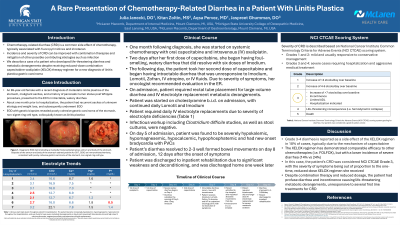Sunday Poster Session
Category: Colon
P0348 - A Rare Presentation of Chemotherapy-Related Diarrhea in a Patient With Linitis Plastica
Sunday, October 27, 2024
3:30 PM - 7:00 PM ET
Location: Exhibit Hall E

Has Audio

Julia Janecki, DO, MSPH
McLaren Macomb Hospital
Mt. Clemens, MI
Presenting Author(s)
Julia Janecki, DO, MSPH1, Kitan Zoltin, MS2, Aqsa Pervez, MD1, Jaspreet Ghumman, DO1
1McLaren Macomb Hospital, Mt. Clemens, MI; 2Michigan State University College of Osteopathic Medicine, East Lansing, MI
Introduction: Chemotherapy-related diarrhea (CRD) is a common side effect of chemotherapy, most commonly seen with fluoropyrimidines and irinotecan. Incidence and severity of CRD can be improved with combination therapies and mitigation of other possible contributing etiologies such as infection. Here we describe a case of a patient who developed profuse diarrhea and metabolic derangements despite receiving reduced-dose combination capecitabine-oxaliplatin (XELOX) therapy regimen for a new diagnosis of linitis plastica gastric carcinoma.
Case Description/Methods: An 89-year-old female with a recent diagnosis of metastatic linitis plastica presented to the emergency department for intractable diarrhea. About one month prior, the patient had ascites and weight loss, prompting esophagoduodenoscopy with biopsies, which revealed poorly cohesive gastric carcinoma of the stomach, i.e. linitis plastica. Following diagnosis, she was started on systemic chemotherapy with capecitabine and oxaliplatin. She received one dose of oxaliplatin and two doses of capecitabine, after which she developed profuse, foul-smelling, non-bloody diarrhea and severe fecal incontinence. She reported up to thirty episodes of diarrhea during the day and night, refractory to Lomotil and Imodium. Rectal tube was placed on admission due to profound diarrhea. Infectious workup was negative. During hospitalization, the patient developed severe electrolyte deficiencies requiring intravenous replacement. Symptoms improved with cholestyramine after twelve days of intractable diarrhea and the patient was discharged to inpatient rehabilitation.
Discussion: Severity of CRD is described based on National Cancer Institute Common Terminology Criteria for Adverse Events (NCI CTCAE) scoring system. Grades 1 and 2 are considered mild and usually responsive to conservative management. Grades 3 and 4 refer to severe cases requiring hospitalization and aggressive medical treatment. In this case, the patient’s CRD was considered NCI CTCAE Grade 3, with the severity of symptoms being out of proportion to the reduced-dose XELOX regimen she received. The XELOX regimen has demonstrated comparable efficacy to other chemotherapies but with a lower incidence of severe diarrhea. However, despite combination therapy and reduced dosage, the patient had profuse diarrhea and incontinence causing life-threatening metabolic derangements. This case highlights a rare presentation of a common side effect and the importance of early recognition of chemotherapy-related conditions.
Disclosures:
Julia Janecki, DO, MSPH1, Kitan Zoltin, MS2, Aqsa Pervez, MD1, Jaspreet Ghumman, DO1. P0348 - A Rare Presentation of Chemotherapy-Related Diarrhea in a Patient With Linitis Plastica, ACG 2024 Annual Scientific Meeting Abstracts. Philadelphia, PA: American College of Gastroenterology.
1McLaren Macomb Hospital, Mt. Clemens, MI; 2Michigan State University College of Osteopathic Medicine, East Lansing, MI
Introduction: Chemotherapy-related diarrhea (CRD) is a common side effect of chemotherapy, most commonly seen with fluoropyrimidines and irinotecan. Incidence and severity of CRD can be improved with combination therapies and mitigation of other possible contributing etiologies such as infection. Here we describe a case of a patient who developed profuse diarrhea and metabolic derangements despite receiving reduced-dose combination capecitabine-oxaliplatin (XELOX) therapy regimen for a new diagnosis of linitis plastica gastric carcinoma.
Case Description/Methods: An 89-year-old female with a recent diagnosis of metastatic linitis plastica presented to the emergency department for intractable diarrhea. About one month prior, the patient had ascites and weight loss, prompting esophagoduodenoscopy with biopsies, which revealed poorly cohesive gastric carcinoma of the stomach, i.e. linitis plastica. Following diagnosis, she was started on systemic chemotherapy with capecitabine and oxaliplatin. She received one dose of oxaliplatin and two doses of capecitabine, after which she developed profuse, foul-smelling, non-bloody diarrhea and severe fecal incontinence. She reported up to thirty episodes of diarrhea during the day and night, refractory to Lomotil and Imodium. Rectal tube was placed on admission due to profound diarrhea. Infectious workup was negative. During hospitalization, the patient developed severe electrolyte deficiencies requiring intravenous replacement. Symptoms improved with cholestyramine after twelve days of intractable diarrhea and the patient was discharged to inpatient rehabilitation.
Discussion: Severity of CRD is described based on National Cancer Institute Common Terminology Criteria for Adverse Events (NCI CTCAE) scoring system. Grades 1 and 2 are considered mild and usually responsive to conservative management. Grades 3 and 4 refer to severe cases requiring hospitalization and aggressive medical treatment. In this case, the patient’s CRD was considered NCI CTCAE Grade 3, with the severity of symptoms being out of proportion to the reduced-dose XELOX regimen she received. The XELOX regimen has demonstrated comparable efficacy to other chemotherapies but with a lower incidence of severe diarrhea. However, despite combination therapy and reduced dosage, the patient had profuse diarrhea and incontinence causing life-threatening metabolic derangements. This case highlights a rare presentation of a common side effect and the importance of early recognition of chemotherapy-related conditions.
Disclosures:
Julia Janecki indicated no relevant financial relationships.
Kitan Zoltin indicated no relevant financial relationships.
Aqsa Pervez indicated no relevant financial relationships.
Jaspreet Ghumman indicated no relevant financial relationships.
Julia Janecki, DO, MSPH1, Kitan Zoltin, MS2, Aqsa Pervez, MD1, Jaspreet Ghumman, DO1. P0348 - A Rare Presentation of Chemotherapy-Related Diarrhea in a Patient With Linitis Plastica, ACG 2024 Annual Scientific Meeting Abstracts. Philadelphia, PA: American College of Gastroenterology.
